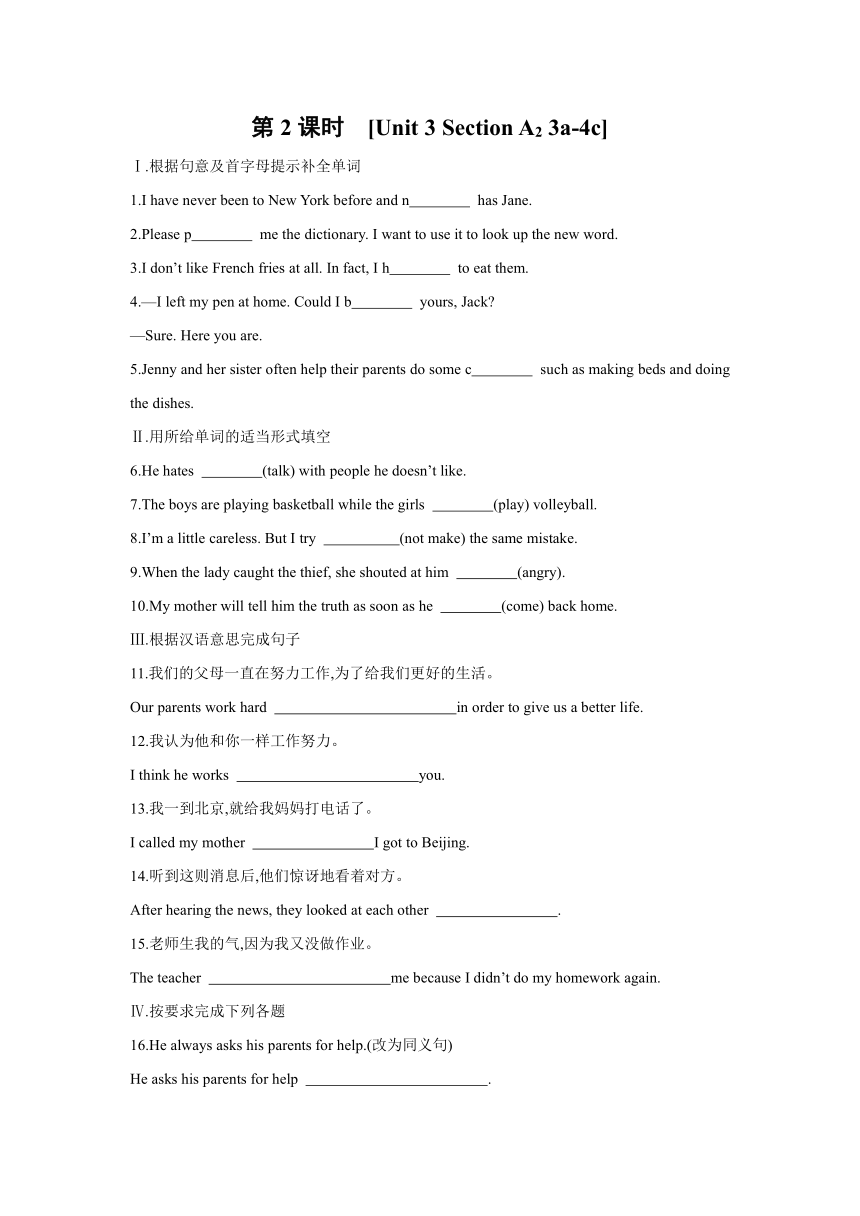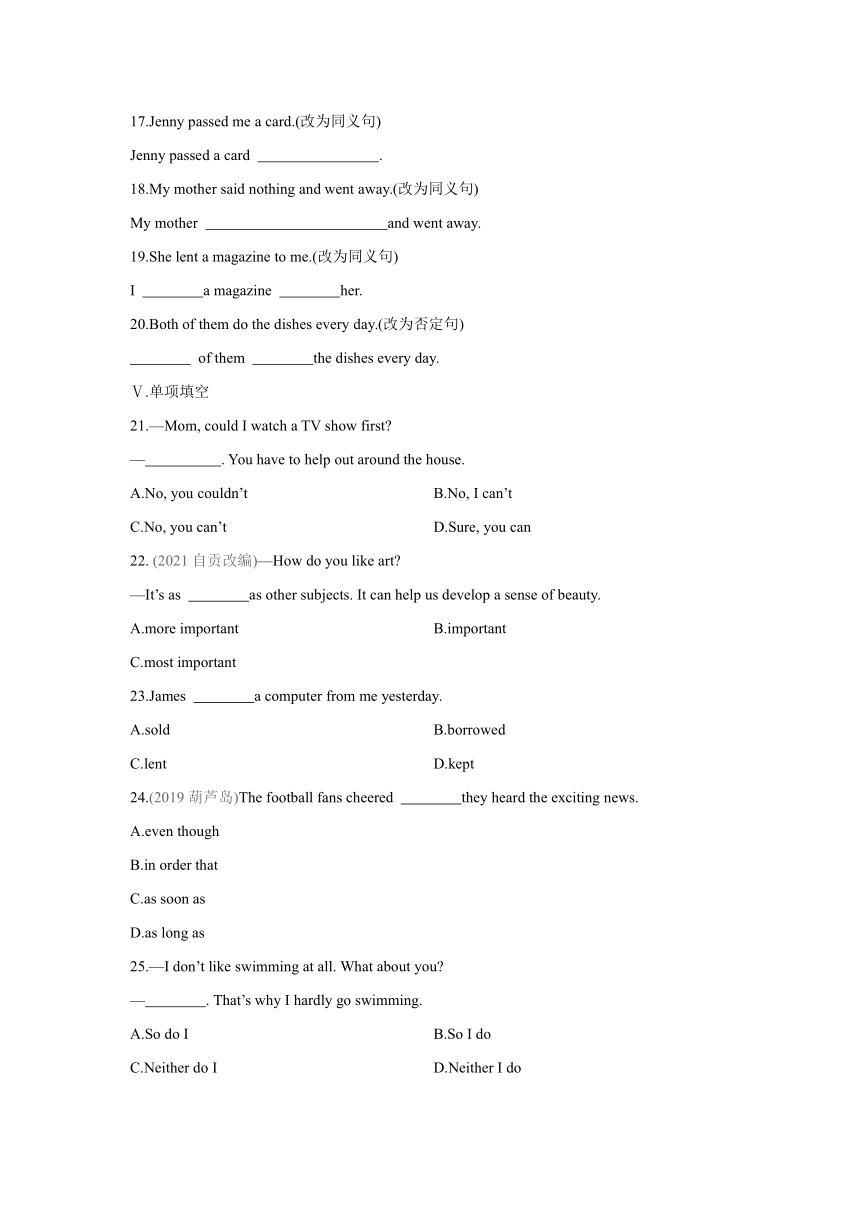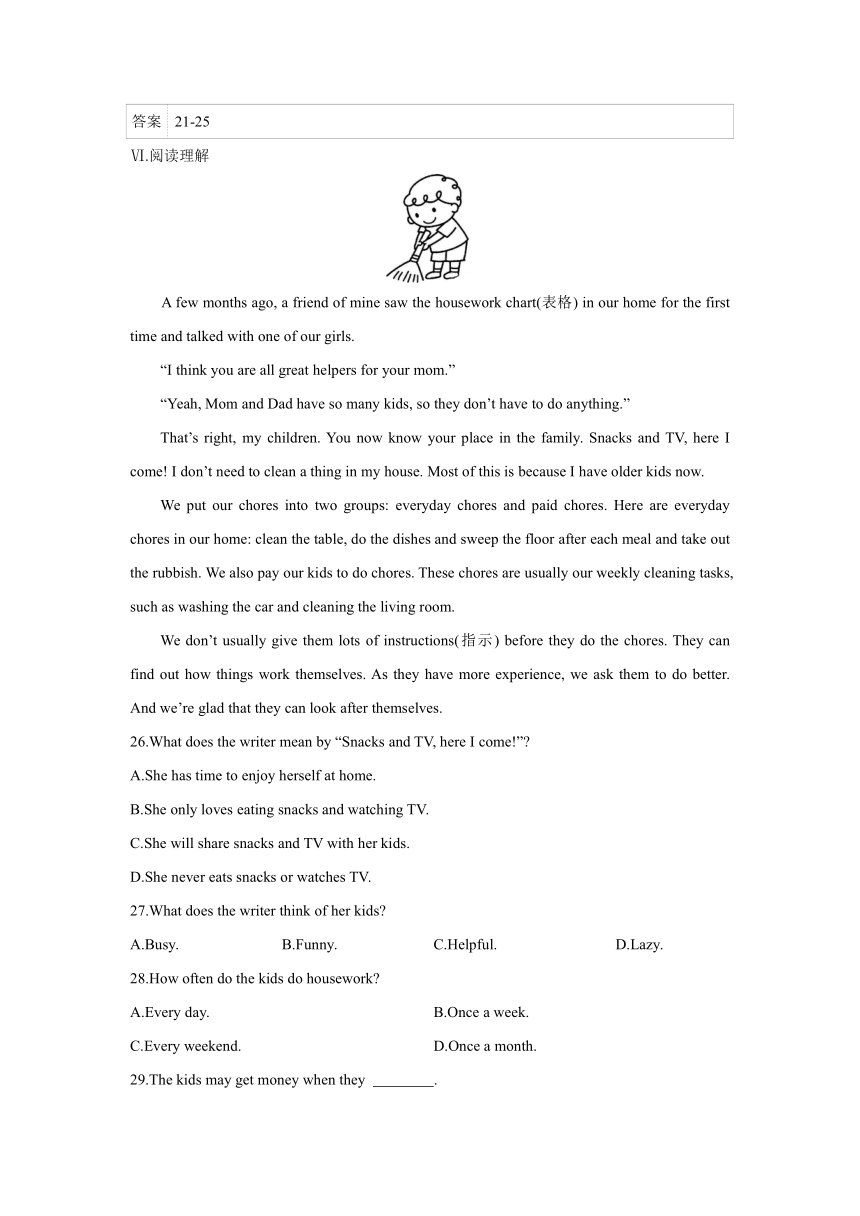人教版英语八年级下册 Unit3 Could you please clean your room? Section A(3a-4c)课课练(含答案)
文档属性
| 名称 | 人教版英语八年级下册 Unit3 Could you please clean your room? Section A(3a-4c)课课练(含答案) |  | |
| 格式 | docx | ||
| 文件大小 | 58.3KB | ||
| 资源类型 | 教案 | ||
| 版本资源 | 人教新目标(Go for it)版 | ||
| 科目 | 英语 | ||
| 更新时间 | 2022-07-13 17:07:46 | ||
图片预览



文档简介
第2课时 [Unit 3 Section A2 3a-4c]
Ⅰ.根据句意及首字母提示补全单词
1.I have never been to New York before and n has Jane.
2.Please p me the dictionary. I want to use it to look up the new word.
3.I don’t like French fries at all. In fact, I h to eat them.
4.—I left my pen at home. Could I b yours, Jack
—Sure. Here you are.
5.Jenny and her sister often help their parents do some c such as making beds and doing the dishes.
Ⅱ.用所给单词的适当形式填空
6.He hates (talk) with people he doesn’t like.
7.The boys are playing basketball while the girls (play) volleyball.
8.I’m a little careless. But I try (not make) the same mistake.
9.When the lady caught the thief, she shouted at him (angry).
10.My mother will tell him the truth as soon as he (come) back home.
Ⅲ.根据汉语意思完成句子
11.我们的父母一直在努力工作,为了给我们更好的生活。
Our parents work hard in order to give us a better life.
12.我认为他和你一样工作努力。
I think he works you.
13.我一到北京,就给我妈妈打电话了。
I called my mother I got to Beijing.
14.听到这则消息后,他们惊讶地看着对方。
After hearing the news, they looked at each other .
15.老师生我的气,因为我又没做作业。
The teacher me because I didn’t do my homework again.
Ⅳ.按要求完成下列各题
16.He always asks his parents for help.(改为同义句)
He asks his parents for help .
17.Jenny passed me a card.(改为同义句)
Jenny passed a card .
18.My mother said nothing and went away.(改为同义句)
My mother and went away.
19.She lent a magazine to me.(改为同义句)
I a magazine her.
20.Both of them do the dishes every day.(改为否定句)
of them the dishes every day.
Ⅴ.单项填空
21.—Mom, could I watch a TV show first
— . You have to help out around the house.
A.No, you couldn’t B.No, I can’t
C.No, you can’t D.Sure, you can
22. (2021自贡改编)—How do you like art
—It’s as as other subjects. It can help us develop a sense of beauty.
A.more important B.important
C.most important
23.James a computer from me yesterday.
A.sold B.borrowed
C.lent D.kept
24.(2019葫芦岛)The football fans cheered they heard the exciting news.
A.even though
B.in order that
C.as soon as
D.as long as
25.—I don’t like swimming at all. What about you
— . That’s why I hardly go swimming.
A.So do I B.So I do
C.Neither do I D.Neither I do
答案 21-25
Ⅵ.阅读理解
A few months ago, a friend of mine saw the housework chart(表格) in our home for the first time and talked with one of our girls.
“I think you are all great helpers for your mom.”
“Yeah, Mom and Dad have so many kids, so they don’t have to do anything.”
That’s right, my children. You now know your place in the family. Snacks and TV, here I come! I don’t need to clean a thing in my house. Most of this is because I have older kids now.
We put our chores into two groups: everyday chores and paid chores. Here are everyday chores in our home: clean the table, do the dishes and sweep the floor after each meal and take out the rubbish. We also pay our kids to do chores. These chores are usually our weekly cleaning tasks, such as washing the car and cleaning the living room.
We don’t usually give them lots of instructions(指示) before they do the chores. They can find out how things work themselves. As they have more experience, we ask them to do better. And we’re glad that they can look after themselves.
26.What does the writer mean by “Snacks and TV, here I come!”
A.She has time to enjoy herself at home.
B.She only loves eating snacks and watching TV.
C.She will share snacks and TV with her kids.
D.She never eats snacks or watches TV.
27.What does the writer think of her kids
A.Busy. B.Funny. C.Helpful. D.Lazy.
28.How often do the kids do housework
A.Every day. B.Once a week.
C.Every weekend. D.Once a month.
29.The kids may get money when they .
A.do the dishes
B.clean the living room
C.take out the rubbish
D.sweep the floor
30.What do we know about the writer
A.She is unfair to some of her kids.
B.She loves doing chores with her kids.
C.She wants her kids to be independent.
D.She doesn’t care about the children.
答案 26-30
答案
Ⅰ.1.neither 2.pass 3.hate
4.borrow 5.chores
Ⅱ.6.talking/to talk
7.are playing 8.not to make
9.angrily es
Ⅲ.11.all the time 12.as hard as
13.the minute/moment
14.in surprise
15.was angry with
Ⅳ.16.all the time
17.to me
18.didn’t say anything
19.borrowed; from
20.Neither; do(es)
Ⅴ.21.C “妈妈,我可以先看一个电视节目吗 ”“不可以,你必须先帮忙做家务。”could 用在表示请求的问句中,回答不能用could/couldn’t ,排除A。根据答语后半句“You have to help out around the house.” 可知妈妈不同意,
22.B “你觉得美术怎么样 ”“它和其他学科一样重要。它可以帮助我们培养美感。”“as+形容词/副词原级+as”是固定用法。
23.B 动词辨析。詹姆斯昨天向我借了一台电脑。sell意为“卖”;borrow意为“借(进)”;lend意为“借(出)”;keep意为“保持,保留”。由句中介词from可知,用borrow sth. from sb.,表示“向某人借某物”,
24.C even though意为“尽管”;in order that意为“为的是”;as soon as意为“一……就……”;as long as意为“只要”。根据本题语境可知,足球迷们一听说那则令人兴奋的消息就欢呼了起来,as soon as符合题意,故答案为C。
25.C 由题干中的“我一点也不喜欢游泳”以及答语中的“这就是我几乎不去游泳的原因”可知,应答者也不喜欢游泳。根据“Neither+be动词/助动词/情态动词+主语.”的倒装句结构可知答案为C。
Ⅵ.【主旨大意】 本文讲述了作者是如何引导和教育她的孩子们做家务的。
26.A
27.C 推理判断题。根据第四段的描述可知,作者不需要做家务,因为她的孩子们会帮她的,由此可推断作者觉得她的孩子们是“有帮助的”,故答案为C。
28.A
29.B 根据第五段中的“We also pay our kids to do chores. These chores are usually our weekly cleaning tasks, such as washing the car and cleaning the living room.”可知,当孩子们做每周清理工作时,“我们”会付钱给他们,如洗车和打扫客厅,故答案为B。
30.C
Ⅰ.根据句意及首字母提示补全单词
1.I have never been to New York before and n has Jane.
2.Please p me the dictionary. I want to use it to look up the new word.
3.I don’t like French fries at all. In fact, I h to eat them.
4.—I left my pen at home. Could I b yours, Jack
—Sure. Here you are.
5.Jenny and her sister often help their parents do some c such as making beds and doing the dishes.
Ⅱ.用所给单词的适当形式填空
6.He hates (talk) with people he doesn’t like.
7.The boys are playing basketball while the girls (play) volleyball.
8.I’m a little careless. But I try (not make) the same mistake.
9.When the lady caught the thief, she shouted at him (angry).
10.My mother will tell him the truth as soon as he (come) back home.
Ⅲ.根据汉语意思完成句子
11.我们的父母一直在努力工作,为了给我们更好的生活。
Our parents work hard in order to give us a better life.
12.我认为他和你一样工作努力。
I think he works you.
13.我一到北京,就给我妈妈打电话了。
I called my mother I got to Beijing.
14.听到这则消息后,他们惊讶地看着对方。
After hearing the news, they looked at each other .
15.老师生我的气,因为我又没做作业。
The teacher me because I didn’t do my homework again.
Ⅳ.按要求完成下列各题
16.He always asks his parents for help.(改为同义句)
He asks his parents for help .
17.Jenny passed me a card.(改为同义句)
Jenny passed a card .
18.My mother said nothing and went away.(改为同义句)
My mother and went away.
19.She lent a magazine to me.(改为同义句)
I a magazine her.
20.Both of them do the dishes every day.(改为否定句)
of them the dishes every day.
Ⅴ.单项填空
21.—Mom, could I watch a TV show first
— . You have to help out around the house.
A.No, you couldn’t B.No, I can’t
C.No, you can’t D.Sure, you can
22. (2021自贡改编)—How do you like art
—It’s as as other subjects. It can help us develop a sense of beauty.
A.more important B.important
C.most important
23.James a computer from me yesterday.
A.sold B.borrowed
C.lent D.kept
24.(2019葫芦岛)The football fans cheered they heard the exciting news.
A.even though
B.in order that
C.as soon as
D.as long as
25.—I don’t like swimming at all. What about you
— . That’s why I hardly go swimming.
A.So do I B.So I do
C.Neither do I D.Neither I do
答案 21-25
Ⅵ.阅读理解
A few months ago, a friend of mine saw the housework chart(表格) in our home for the first time and talked with one of our girls.
“I think you are all great helpers for your mom.”
“Yeah, Mom and Dad have so many kids, so they don’t have to do anything.”
That’s right, my children. You now know your place in the family. Snacks and TV, here I come! I don’t need to clean a thing in my house. Most of this is because I have older kids now.
We put our chores into two groups: everyday chores and paid chores. Here are everyday chores in our home: clean the table, do the dishes and sweep the floor after each meal and take out the rubbish. We also pay our kids to do chores. These chores are usually our weekly cleaning tasks, such as washing the car and cleaning the living room.
We don’t usually give them lots of instructions(指示) before they do the chores. They can find out how things work themselves. As they have more experience, we ask them to do better. And we’re glad that they can look after themselves.
26.What does the writer mean by “Snacks and TV, here I come!”
A.She has time to enjoy herself at home.
B.She only loves eating snacks and watching TV.
C.She will share snacks and TV with her kids.
D.She never eats snacks or watches TV.
27.What does the writer think of her kids
A.Busy. B.Funny. C.Helpful. D.Lazy.
28.How often do the kids do housework
A.Every day. B.Once a week.
C.Every weekend. D.Once a month.
29.The kids may get money when they .
A.do the dishes
B.clean the living room
C.take out the rubbish
D.sweep the floor
30.What do we know about the writer
A.She is unfair to some of her kids.
B.She loves doing chores with her kids.
C.She wants her kids to be independent.
D.She doesn’t care about the children.
答案 26-30
答案
Ⅰ.1.neither 2.pass 3.hate
4.borrow 5.chores
Ⅱ.6.talking/to talk
7.are playing 8.not to make
9.angrily es
Ⅲ.11.all the time 12.as hard as
13.the minute/moment
14.in surprise
15.was angry with
Ⅳ.16.all the time
17.to me
18.didn’t say anything
19.borrowed; from
20.Neither; do(es)
Ⅴ.21.C “妈妈,我可以先看一个电视节目吗 ”“不可以,你必须先帮忙做家务。”could 用在表示请求的问句中,回答不能用could/couldn’t ,排除A。根据答语后半句“You have to help out around the house.” 可知妈妈不同意,
22.B “你觉得美术怎么样 ”“它和其他学科一样重要。它可以帮助我们培养美感。”“as+形容词/副词原级+as”是固定用法。
23.B 动词辨析。詹姆斯昨天向我借了一台电脑。sell意为“卖”;borrow意为“借(进)”;lend意为“借(出)”;keep意为“保持,保留”。由句中介词from可知,用borrow sth. from sb.,表示“向某人借某物”,
24.C even though意为“尽管”;in order that意为“为的是”;as soon as意为“一……就……”;as long as意为“只要”。根据本题语境可知,足球迷们一听说那则令人兴奋的消息就欢呼了起来,as soon as符合题意,故答案为C。
25.C 由题干中的“我一点也不喜欢游泳”以及答语中的“这就是我几乎不去游泳的原因”可知,应答者也不喜欢游泳。根据“Neither+be动词/助动词/情态动词+主语.”的倒装句结构可知答案为C。
Ⅵ.【主旨大意】 本文讲述了作者是如何引导和教育她的孩子们做家务的。
26.A
27.C 推理判断题。根据第四段的描述可知,作者不需要做家务,因为她的孩子们会帮她的,由此可推断作者觉得她的孩子们是“有帮助的”,故答案为C。
28.A
29.B 根据第五段中的“We also pay our kids to do chores. These chores are usually our weekly cleaning tasks, such as washing the car and cleaning the living room.”可知,当孩子们做每周清理工作时,“我们”会付钱给他们,如洗车和打扫客厅,故答案为B。
30.C
同课章节目录
- Unit 1 What's the matter?
- Section A
- Section B
- Unit 2 I'll help to clean up the city parks.
- Section A
- Section B
- Unit 3 Could you please clean your room?
- Section A
- Section B
- Unit 4 Why don't you talk to your parents?
- Section A
- Section B
- Unit 5 What were you doing when the rainstorm came
- Section A
- Section B
- Review of Units 1-5
- Unit 6 An old man tried to move the mountains.
- Section A
- Section B
- Unit 7 What's the highest mountain in the world?
- Section A
- Section B
- Unit 8 Have you read Treasure Island yet?
- Section A
- Section B
- Unit 9 Have you ever been to a museum?
- Section A
- Section B
- Unit 10 I've had this bike for three years.
- Section A
- Section B
